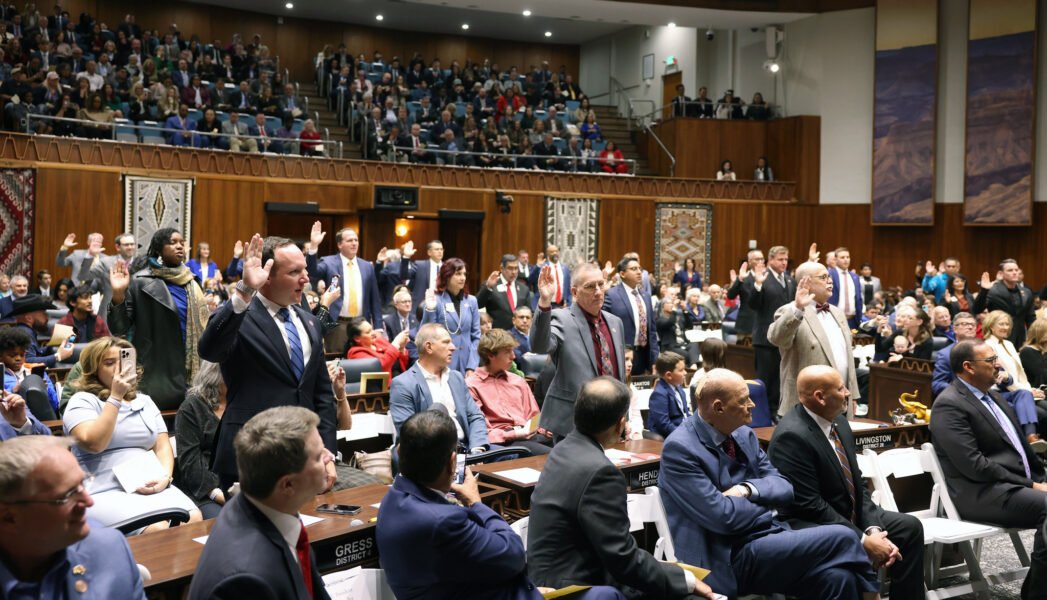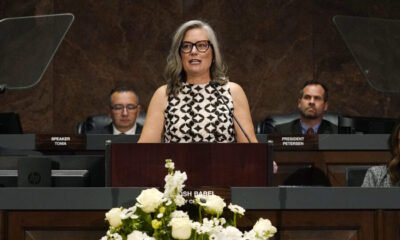arizona
AZ House Greenlights Bipartisan Budget Package, Sends It Back to Senate

The Arizona House of Representatives has approved a bipartisan budget package, clearing the path for Governor Katie Hobbs’ signature. This decisive action mitigates the threat of a government shutdown, expected if an agreement wasn’t reached by June 30.
This marks the third budget proposal the House has considered, with this version securing Democratic support for the first time. Senate Bill 1735 garnered a notable 40-16 vote, despite attempts by some House Republicans to challenge it.
Speaker Steve Montenegro, R-Goodyear, emphasized the collaborative effort required in a divided government. “We’re holding the line on spending. We’re holding the line on school choice,” he stated, highlighting the assembly’s commitment to their values.
The approved budget totals $17.6 billion and was amended slightly by the Senate to facilitate consensus among House members.
A Senate GOP news release suggests the Senate will likely endorse these amendments by June 27, paving the way for the governor’s approval, further solidifying this fiscal plan.
Senate President Warren Petersen, R-Gilbert, remarked on the consensus achieved. “We believe this is a bipartisan spending plan that will get signed,” he stated, referring to the funding prioritization for core government functions, which includes K-12 education, public safety, and small business support.
The recent vote follows weeks of efforts from House Republicans, who initially sought a lower-spending budget. Their first attempt, a $17.3 billion proposal on June 13, failed due to lack of Senate support.
Facing an impasse, House Republicans later introduced a $17 billion continuation budget on June 24, which also faced rejection from the governor.
Consequently, the Senate’s bipartisan budget became the sole viable option, as both previous proposals were vetoed quickly by Hobbs.
House Minority Leader Oscar De Los Santos, D-Laveen, noted the budget includes significant Democratic advancements, particularly for public education and health care. “This balanced budget delivers for public school students and Medicaid,” he remarked.
Key provisions of the budget feature $27 million designated for the Department of Public Safety’s equipment, a 5% pay increase for law enforcement, and an extensive $119 million allocation for transportation initiatives, including major I-10 projects.
Additionally, $281 million is earmarked for K-12 education, with the majority focused on school building renovations. The Arizona Promise Program will also benefit from a $16 million infusion to assist low-income college students.
During discussions, Rep. Lupe Contreras, D-Avondale, stressed the imperative of passing the budget to ensure governmental continuity. “We have to do what the federal government is not willing to do for this state,” he urged.
Despite the bipartisan nature of the budget, some opposition surfaced from certain House Republicans and Freedom Caucus members, who sought amendments targeting health care provisions for undocumented individuals.
The budget also reflects a departure from earlier proposals that suggested a 2.5% reduction in in-state college tuition, a measure excluded from the current agreement.
Some House Democrats also voiced dissent, particularly regarding funding allocations for controversial measures linked to immigration enforcement. Concerns linger about the implications of such expenditures in light of current federal policies.
The House additionally voted to waive the aggregate expenditure limit for public schools for the next two fiscal years. Legislators anticipate concluding this session with the Senate by Friday.




![Members of the Arizona House of Representatives vote during a third reading of nearly three dozen bills at the Arizona State Capitol on March 4, 2025. [Monica D. Spencer]](https://arizonanews.org/wp-content/uploads/2025/06/SR-347-Secures-53M-in-Third-State-Budget-Draft-Awaiting-400x240.jpg)
![Members of the Arizona House of Representatives vote during a third reading of nearly three dozen bills at the Arizona State Capitol on March 4, 2025. [Monica D. Spencer]](https://arizonanews.org/wp-content/uploads/2025/06/SR-347-Secures-53M-in-Third-State-Budget-Draft-Awaiting-80x80.jpg)











